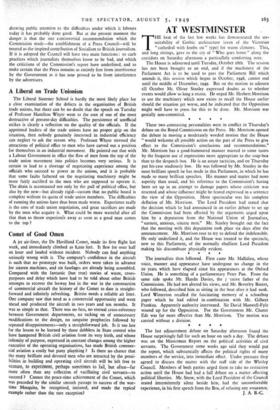A Liberal on Trade Unionism
The Liberal Summer School is hardly the most likely place for a close examination of the defects in the organiiation of British trade unions, but there can be no doubt that the speech on Tuesday of Professor Hamilton Whyte went to the root of one of the most destructive of present-day difficulties. The persistence of unofficial strikes is clearly a reflection on the quality of the officials. If the appointed leaders of the trade unions have no proper grip on the situation, then nobody genuinely interested in industrial efficiency can neglect to ask the reason why. Professor Whyte stressed the attractions of political office to men who have carved out a position for themselves in an industrial movement. He pointed out that with a Labour Government in office the flow of men from the top of the trade union movement into politics becomes very serious. It is certain to lead to a shortage of negotiating experience among the officials who succeed to power in the unions, and it is probable that some faults fathered on the negotiating machinery might be more fairly ascribed to . the men who are supposed to operate it. The drain is accentuated not only by the pull of political office, but also by the new—but already rigid—custom that no public board is complete without its quota of trade union members. The difficulties of running the unions have thus been made worse. Experience really is the core of trade union negotiation, and great sacrifices are made by the men who acquire it. What could be more wasteful after all that than to throw experienCe away as soon as a good man comes to the top ?


































 Previous page
Previous page